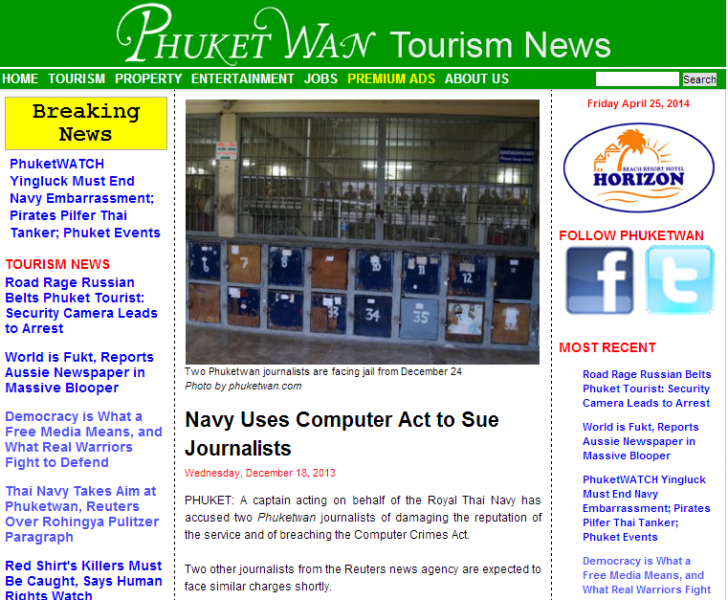 Two Thailand-based reporters for online news and tourism magazine Phuketwan have been sued by the Royal Thai Navy for defamation and an alleged violation of the Computer Crimes Act 2007, which covers defamation, data-related crimes, and Thailand's infamous lèse majesté policy against criticizing the King. If convicted, the men could face up to seven years in jail.
Two Thailand-based reporters for online news and tourism magazine Phuketwan have been sued by the Royal Thai Navy for defamation and an alleged violation of the Computer Crimes Act 2007, which covers defamation, data-related crimes, and Thailand's infamous lèse majesté policy against criticizing the King. If convicted, the men could face up to seven years in jail.
The lawsuit was filed last December, five months after Phuketwan posted a story about the plight of Rohingya refugees written by Chutima Sidasathian. The news story included multiple quotes from a Reuters’ investigative report alleging that certain Thai officials have been involved in the illegal trafficking of Rohingya refugees.
An ethic group based largely in South and Southeast Asia, the Rohingya are recognized as among the most persecuted ethnic groups in the world. In Myanmar, Rohingyas are not given citizenship because the government treats them as illegal immigrants. Recent years have seen many Muslim Rohingyas fleeing Myanmar to settle in majority-Muslim communities of Malaysia and southern Thailand, but these migrants often end up in refugee centers.
The Reuters story about the persecution suffered by the Rohingyas received a 2014 Pulitzer Prize for International Reporting.
After learning about the defamation suit, this joint statement was issued by Chutima and Alan Morison, the Australian editor of Phuketwan:
The Rohingya have no spokesperson, no leader, but through Phuketwan's ongoing coverage, the torment of these people continues to be revealed.
Their forced exodus from Burma is a great tragedy. Yet how they are treated in the seas off Thailand and in Thailand remains a constant puzzle.
We wish the Royal Thai Navy would clear its reputation by explaining precisely what is happening to the Rohingya in the Andaman Sea and in Thailand.
By instead using a controversial law against us, the Navy is, we believe, acting out of character.
Last week, Alan Morison reiterated that Phuketwan does not deserve to be penalized for exposing the plight of the Rohingyas:
The only ”crime” my colleague Chutima Sidasathian and I have committed is to report what's been happening in Thailand to the stateless Rohingya.
By suing the media, the Royal Thai Navy is clearly not in favor of free speech.
And by staying silent and secretive about what is happening to the Rohingya boatpeople off the coast and inside Thailand, the Royal Thai Navy clearly does not want the citizens of Thailand – or the world – to know what it is doing.
Prior to the initial court hearing last April 17, some hoped that the charges against Phuketwan will be dropped on May 3, which will coincide with the World Press Freedom Day. But Third Navy Fleet Commander and Vice Admiral Tharathorn Khajitsuwan announced in an interview with the Bangkok Post that a separate case will be filed against Reuters as well:
Not only do we refuse to withdraw any lawsuit, but we are processing another suit against Reuters as well.
The defamation case against Phuketwan has received little attention from mainstream media. The accused say they have gotten no response or assistance from the National Human Rights Commission and the Thai Journalist Association. Reuters also never contacted the reporters. David Crundwell, Reuters’ head of corporate affairs, explained to the Bangkok Post why it didn’t get involved in the Phuketwan case:
The case against Phuketwan arises out of aspects of our story being excerpted by Phuketwan from our original, and fully comprehensive, story. Their story was materially different in content and tone from the Reuters story.
But Phuketwan found support from various media advocacy groups which have been urging the government to drop the defamation case. Saksith Saiyasombut wrote that the suit reflected the dismal state of press freedom in Thailand:
The move sends a chilling reminder to the media about the dismal state of press freedom in Thailand, the easy exploitation of flawed laws and how little outside inquiry Thailand’s military tolerates.
The Foreign Correspondents’ Club of Thailand said the case
serves only to stifle media freedom on an issue of profound importance to the rights of persecuted people.
Benjamin Ismaïl of the Reporters Without Borders Asia-Pacific desk said it is time to reform the Computer Crimes Act:
Taking Phuketwan’s journalists to court is absurd. If the navy want to dispute the Reuters special report, which has just won a Pulitzer Prize, it can publicly give its version of events and demand the right of reply.
By using the Computer Crimes Act to intimidate journalists, the navy is just making it obvious that it wants to conceal this sensitive information and deter any comments on this humanitarian scandal. We urge the court not to proceed with this improper complaint.
This case highlights the urgent need for reform of the Computer Crimes Acts, which is responsible for frequent violations of freedom of information by the authorities.
The Southeast Asian Press Alliance also believes that the law is being used to harass government critics in order to silence legitimate dissent:
Targeting a small online news outlet for publishing what is essentially a humanitarian story reflects a bully’s strategy to silence critics, sending a strong warning that anyone who expresses something they disapprove of will be prosecuted. The Navy is thus using its authority for the wrong purpose of silencing critics instead of for upholding accountability of the conduct its forces and its overall duty to respect human rights.
Their action also reinforces the criticism against the Computer Crimes Act of 2007, which makes online users liable for content originally published by others.
The next court hearing will take place on May 26.



